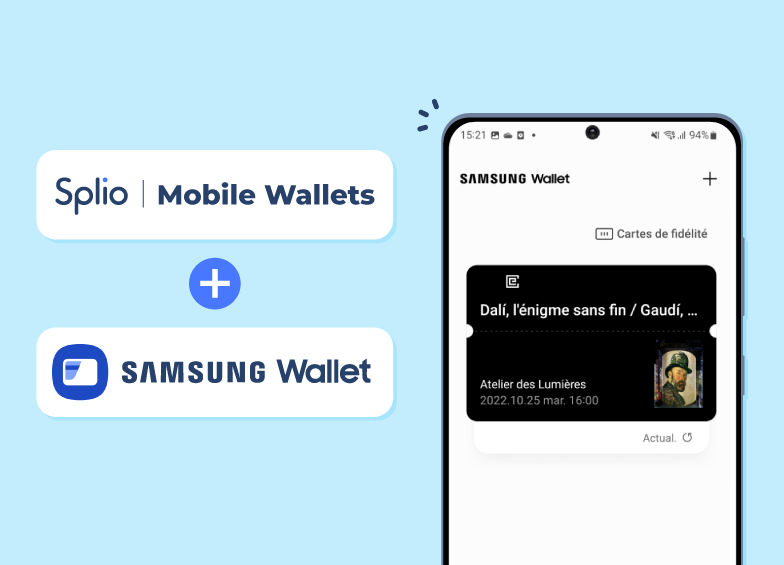Samsung Wallet: Splio, first partner in Europe



Marie Chevrie
Category: Mobile Wallets
What consumer doesn't own a smartphone today? With a population equipment rate of nearly 80% (Insee 2021 study) and the intensification of their use, brands are gradually taking over Mobile Wallets, a new essential CRM channel for customer marketing teams.
With the emergence of Mobile Wallets, CRM teams can indeed fluidify the customer experience and engage in a close relationship with each of them.
Convinced of the value of Mobile Wallets for brands, Splio is actively participating in the development of this unusual channel and its many functionalities, by partnering with major players in the sector. The company has positioned itself as a partner of choice with major players (Apple, Google) and more recently with Samsung, which launched Samsung Wallet last month.
Splio is the first European Samsung Wallet partner to support brands in integrating Samsung Wallet with their CRM tools, so they can offer a seamless experience to their Samsung customers.
Samsung Wallet is the result of the merger between Samsung Pay (used mainly for payment, travel passes and static pass management) and Samsung Pass (ID management). Samsung Wallet aims to provide Samsung users a way to centralize their credit cards, boarding passes, tickets, digital keys and credentials, loyalty cards, and more within a single application, similarly to Apple Wallet and Google Wallet.
Splio and Samsung have worked closely together so that brands can now orchestrate their customer marketing campaigns and engage with Samsung Wallet users through Splio Mobile Wallets.
We have deployed our first client: Culturespaces, which operates on behalf of immersive exhibition venues such as Atelier des Lumières (Paris), Bassins des Lumières (Bordeaux), etc., and now enables customers with a Samsung smartphone to save their dematerialized ticket in their mobile.
The wallet's dematerialization simplifies the daily life of consumers by making all types of cards accessible directly from their smartphones. If at the beginning the different players (Apple, Google, Samsung, Lyfpay...) only proposed a few use cases (payment, transportation, loyalty...), they tend these last years to diversify the offer by offering the possibility to dematerialize ID cards, driving licenses, car keys... which greatly favors the constant increase of the Mobile Wallets' use.
The dematerialization of the wallet in the Mobile Wallet, especially of credit cards, gives agility to customers who only have to go to the store with their mobile in their pocket. This has opened the way to other use cases for retail brands, some of which are essential for customer marketing teams.
Everything that used to be complicated to store in a wallet and therefore regularly lost or forgotten is now stored in Mobile Wallets. By dematerializing these cards, brands offer peace of mind to their customers.
The dematerialization of the loyalty card will make the customer experience even more fluid and will enable customers to access their loyalty information in real time (points, rewards, expiry date...), to get recognition and to hasten the checkout... It also gives them back autonomy by giving them the opportunity to register themselves to a program thanks to QR codes displayed in store.
But this is not the only CRM advantage! The digitalization of cards and promotional or relational incentives also enables brands to have greater control over their distribution and to better track their usage.
As with any campaign, marketers can segment and personalize their messages with customer data. Opening up this new CRM channel is critical for loyalty program animation, which can be complex and time consuming. With Wallets Push Notifications, marketing teams can now communicate with their loyal customers through their dematerialized loyalty cards, which was not possible with physical cards.
But it doesn't stop there, as it is also possible for a brand to activate personalized geofenced messages that are automatically displayed when a customer is near a store. This allows brands to increase in-store traffic while engaging their customers by making it easier for them to identify themselves at checkout.
Brands need to integrate mobile into their marketing strategy. If some means already existed - like SMS and push apps for brands having their own application, wallets push notifications complete the mobile channels available to marketing teams. They help brands to ensure a higher conversion rate and do not require any particular development, as is the case for an application.
Learn more about Splio Mobile Wallets and how to use them in your CRM strategy, contact us !
Contents